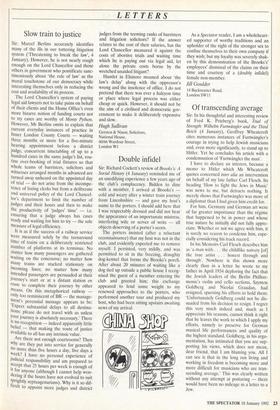LETTERS Slow train to justice
Sir: Marcel Berlins accurately identifies many of the ills in our tottering litigation system (Threatening to break the law', 4 January). However, he is not nearly rough enough on the Lord Chancellor and those others in government who pontificate sanc- timoniously about 'the rule of law' as the moral touchstone of our democracy while interesting themselves only in reducing the cost and availability of its process.
The Lord Chancellor's system of paying legal aid lawyers not to take pains on behalf of their clients and the Home Office's even more bizarre notion of funding courts not to try cases are worthy of Monty Python. However, Mr Berlins omits to explain that current everyday instances of practice in Inner London County Courts — waiting three months or more for a five-minute hearing appointment before a district judge, concurrent timetabling of up to a hundred cases in the same judge's list, rou- tine over-booking of trial fixtures so that whole teams of barristers, solicitors and witnesses arranged months in advanced are turned away unheard on the appointed day of trial — do not arise from the incompe- tence of listing clerks but from a deliberate and universal policy of the Lord Chancel- lor's department to limit the number of judges and their hours and then to make the productivity of 'judges' time' — i.e. ensuring that a judge always has cases ready and waiting for him to try — the sole measure of legal efficiency.
It is as if the success of a railway service were measured solely by the turnaround time of trains on a deliberately restricted number of platforms at its terminus. No matter how many passengers are gathered waiting on the concourse; no matter how many trains are stacked stationary on incoming lines; no matter how many intended passengers are persuaded at their journey's start or at a distant station en route to complete their journey by other means. On this metaphorical railway only too reminiscent of BR — the manage- ment's perennial message appears to be: Expect substantial delays to all destina- tions: please do not travel with us unless your journey is absolutely necessary.' There Is no recognition — indeed apparently little belief — that making the route of justice available to all has any intrinsic value.
Are there not enough courtrooms? Then why are they put into service for generally no more than five hours a day, five days a week? I have no personal experience of judicial responsibility and am prepared to accept that 25 hours per week is enough of
it for anyone (although I cannot help won- dering if the hours have not evolved to suit sprightly septuagenarians). Why is it so dif, ficult to appoint more judges and district
judges from the teeming ranks of barristers and litigation solicitors? If the answer relates to the cost of their salaries, has the Lord Chancellor measured it against the costs of abortive trials and waiting time which he is paying out via legal aid, let alone the private costs borne by the wretched unaided litigant?
Hamlet in Elsinore moaned about `the law's delay' along with the oppressor's wrong and the insolence of office. I do not pretend that there was ever a halcyon time or place where legal process was either cheap or quick. However, it should not be the aim of a civilised and democratic gov- ernment to make it deliberately expensive and slow.
Hugh Sullivan
Gersten & Nixon, Solicitors, National House, 60/66 Wardour Street, London WI


















































 Previous page
Previous page